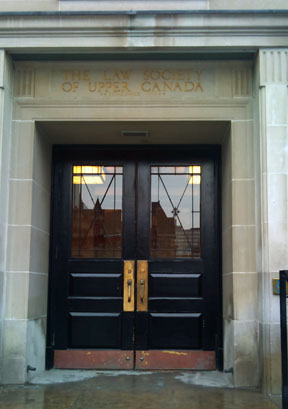A Law Society of Upper Canada appeal panel says Gladue principles apply in disciplinary hearings, albeit differently than in criminal proceedings.
 The panel made the comments while allowing the appeal of a Sarnia, Ont., lawyer who argued his Aboriginal status should have been considered as a mitigating factor in his sentencing.
The panel made the comments while allowing the appeal of a Sarnia, Ont., lawyer who argued his Aboriginal status should have been considered as a mitigating factor in his sentencing.
Terence Robinson pled guilty to an aggravated assault in 2009. He agreed that his conviction “amounted to conduct unbecoming a lawyer,” according to the law society appeal panel decision. But Robinson took issue with a hearing panel that decided his Aboriginal background was not a mitigating factor while determining the length of his suspension.
The hearing panel imposed a two-year suspension, which was reduced to 12 months on appeal.
The initial suspension was imposed after the hearing panel dismissed evidence that Robinson was discriminated against as a lawyer because of his Aboriginal background. He could have been mistreated for a number of other reasons, the panel concluded.
“Perhaps the lawyer was difficult counsel. Perhaps he refused to grant indulgences or to extend courtesies. We will never know because the lawyer chose not to testify, which is his right,” the hearing panel had said.
Disagreeing with this finding, the appeal panel said the available evidence suggests Robinson is in fact a well-mannered lawyer who could not have been mistreated because of his character alone.
“In our respectful view, the hearing panel erred in concluding that the appellant’s Aboriginal background was not a mitigating factor,” said Mark Sandler, who wrote on the behalf of appeal panel.
Sandler added: “In our view, it was unreasonable to conclude that there was no evidence that the appellant had been treated differently as a result of his Aboriginal heritage and/or his defence work.”
The hearing panel had also lamented the lack of “case-specific evidence” when it comes to how Robinson’s racial background affected him.
“We disagree,” Sandler said. “Here, there was case-specific information, presented by unchallenged witnesses, that the appellant had been subject to differential treatment based on his Aboriginal heritage and/or his defence work on behalf of Aboriginal clients.
“With respect, the hearing panel misapprehended or failed to appreciate the evidence on point,” Sandler added, citing evidence of Robinson’s history of racial profiling by police.
In addition to the finding on discrimination, the appeal panel also disagreed with the hearing panel that Robinson had to prove being adversely affected by his mother and grandmother’s history of residential school.
“We were also told that the lawyer’s mother and grandmother were sent to residential schools,” the hearing panel had said. “There is absolutely no evidence that the lawyer was adversely affected because of his mother and grandmother having been sent away to residential schools as children.”
Although it did not affect its ultimate disposition, the appeal panel said Robinson should not have to prove that the residential school legacy affected him.
“The Supreme Court of Canada has noted the intergenerational impact of the residential school system and other manifestations of racism and discrimination, and cautioned against placing an impossible burden on Aboriginal people to demonstrate such impact,” Sandler added.
The altered sentencing means Robinson has now concluded his suspension.
 The panel made the comments while allowing the appeal of a Sarnia, Ont., lawyer who argued his Aboriginal status should have been considered as a mitigating factor in his sentencing.
The panel made the comments while allowing the appeal of a Sarnia, Ont., lawyer who argued his Aboriginal status should have been considered as a mitigating factor in his sentencing.Terence Robinson pled guilty to an aggravated assault in 2009. He agreed that his conviction “amounted to conduct unbecoming a lawyer,” according to the law society appeal panel decision. But Robinson took issue with a hearing panel that decided his Aboriginal background was not a mitigating factor while determining the length of his suspension.
The hearing panel imposed a two-year suspension, which was reduced to 12 months on appeal.
The initial suspension was imposed after the hearing panel dismissed evidence that Robinson was discriminated against as a lawyer because of his Aboriginal background. He could have been mistreated for a number of other reasons, the panel concluded.
“Perhaps the lawyer was difficult counsel. Perhaps he refused to grant indulgences or to extend courtesies. We will never know because the lawyer chose not to testify, which is his right,” the hearing panel had said.
Disagreeing with this finding, the appeal panel said the available evidence suggests Robinson is in fact a well-mannered lawyer who could not have been mistreated because of his character alone.
“In our respectful view, the hearing panel erred in concluding that the appellant’s Aboriginal background was not a mitigating factor,” said Mark Sandler, who wrote on the behalf of appeal panel.
Sandler added: “In our view, it was unreasonable to conclude that there was no evidence that the appellant had been treated differently as a result of his Aboriginal heritage and/or his defence work.”
The hearing panel had also lamented the lack of “case-specific evidence” when it comes to how Robinson’s racial background affected him.
“We disagree,” Sandler said. “Here, there was case-specific information, presented by unchallenged witnesses, that the appellant had been subject to differential treatment based on his Aboriginal heritage and/or his defence work on behalf of Aboriginal clients.
“With respect, the hearing panel misapprehended or failed to appreciate the evidence on point,” Sandler added, citing evidence of Robinson’s history of racial profiling by police.
In addition to the finding on discrimination, the appeal panel also disagreed with the hearing panel that Robinson had to prove being adversely affected by his mother and grandmother’s history of residential school.
“We were also told that the lawyer’s mother and grandmother were sent to residential schools,” the hearing panel had said. “There is absolutely no evidence that the lawyer was adversely affected because of his mother and grandmother having been sent away to residential schools as children.”
Although it did not affect its ultimate disposition, the appeal panel said Robinson should not have to prove that the residential school legacy affected him.
“The Supreme Court of Canada has noted the intergenerational impact of the residential school system and other manifestations of racism and discrimination, and cautioned against placing an impossible burden on Aboriginal people to demonstrate such impact,” Sandler added.
The altered sentencing means Robinson has now concluded his suspension.







